广东省深圳市文汇中学八年级英语上册 Module 1 Unit 1 Encyclopaedias Speaking 课件
文档属性
| 名称 | 广东省深圳市文汇中学八年级英语上册 Module 1 Unit 1 Encyclopaedias Speaking 课件 |
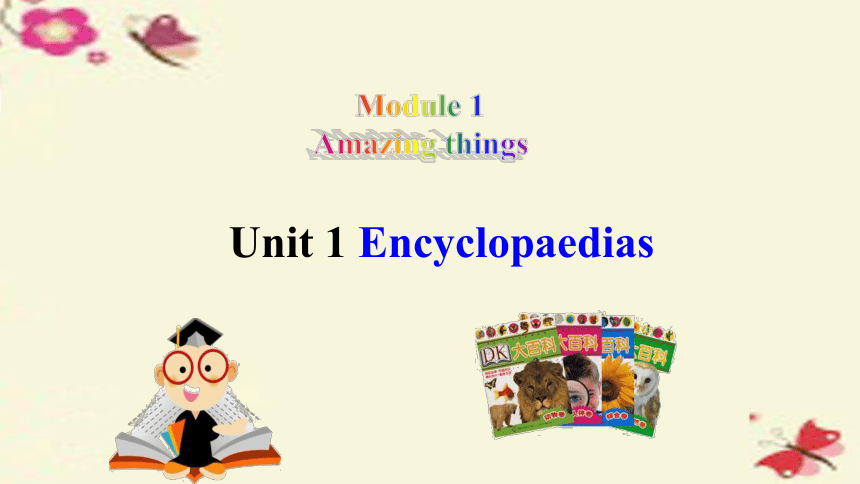
|
|
| 格式 | zip | ||
| 文件大小 | 2.6MB | ||
| 资源类型 | 教案 | ||
| 版本资源 | 牛津深圳版 | ||
| 科目 | 英语 | ||
| 更新时间 | 2016-12-13 00:00:00 | ||
图片预览

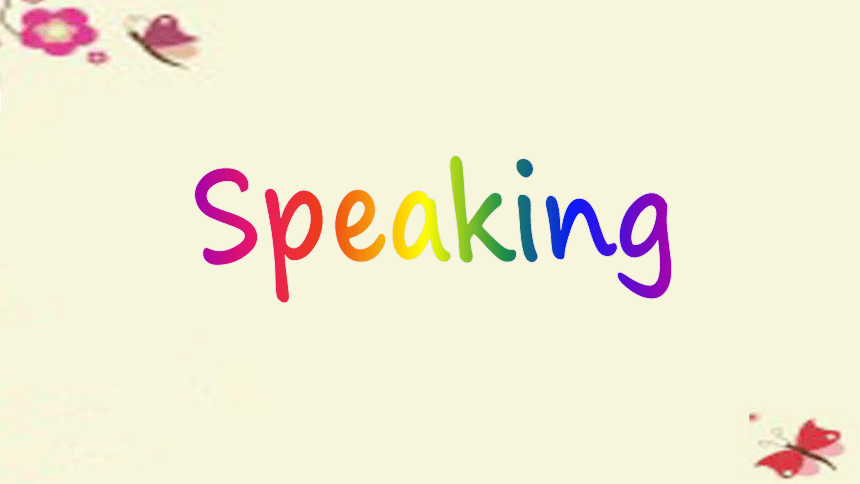
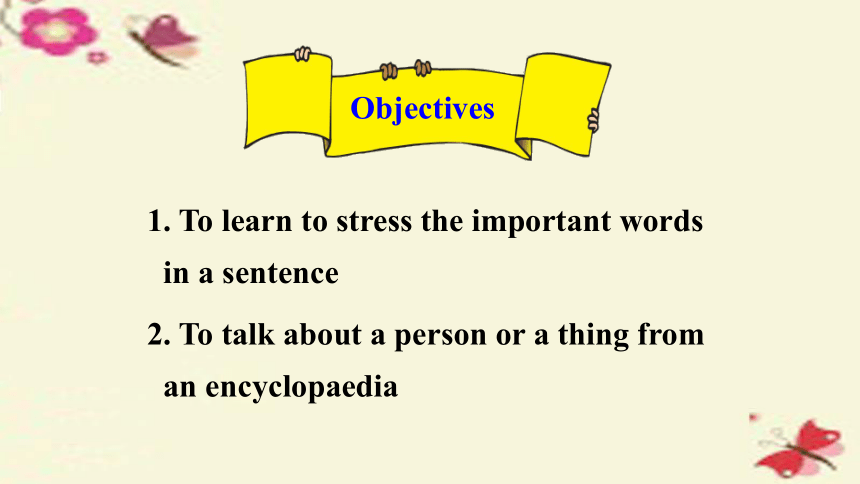

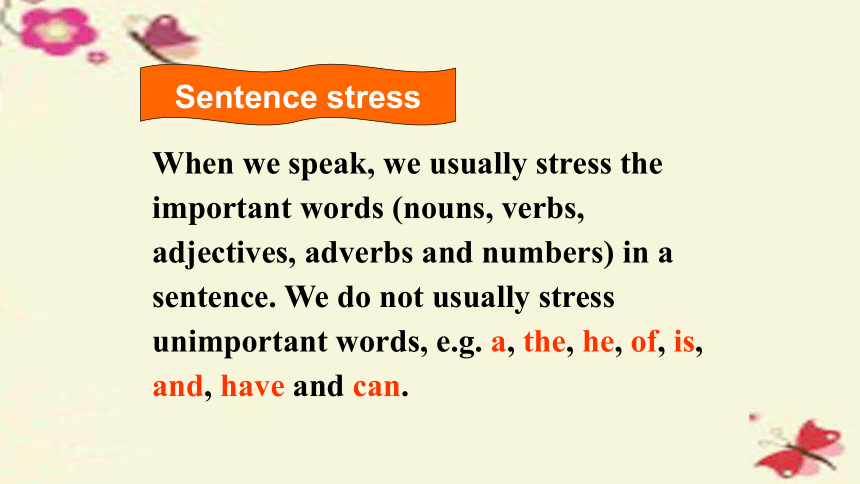
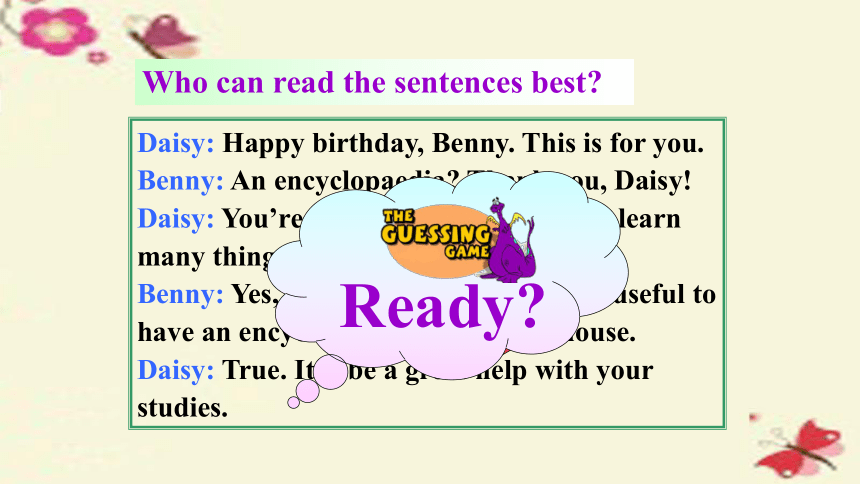
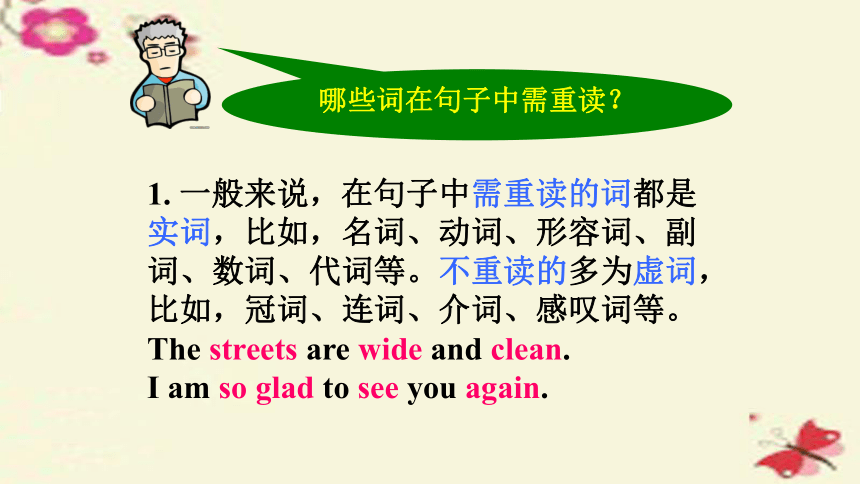

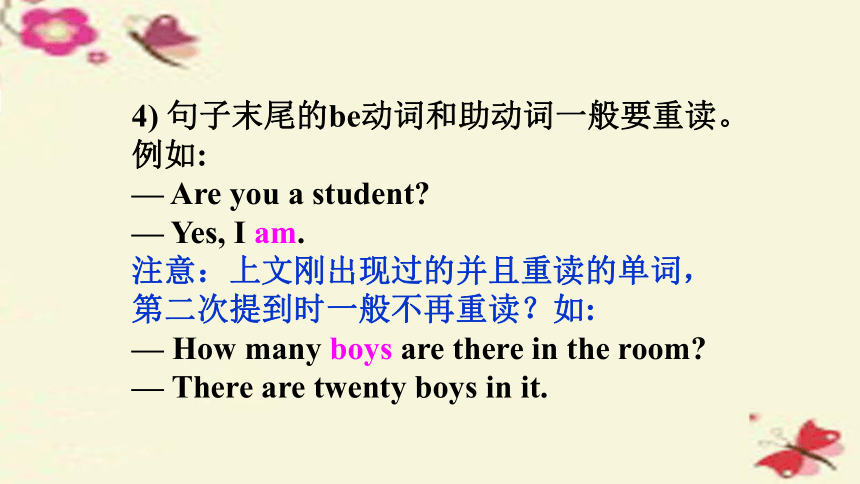
文档简介
课件20张PPT。Module 1
Amazing thingsUnit 1 EncyclopaediasSpeaking1. To learn to stress the important words in a sentence
2. To talk about a person or a thing from an encyclopaediaObjectivesWhen we speak, we usually stress the important words (nouns, verbs, adjectives, adverbs and numbers) in a sentence. We do not usually stress unimportant words, e.g. a, the, he, of, is, and, have and can.Sentence stressDaisy: Happy birthday, Benny. This is for you.
Benny: An encyclopaedia? Thank you, Daisy!
Daisy: You’re welcome. I’m sure you’ll learn many things from it.
Benny: Yes, I’m sure I will. It’s always useful to have an encyclopaedia around the house.
Daisy: True. It’ll be a great help with your studies.Who can read the sentences best?go1. 一般来说,在句子中需重读的词都是实词,比如,名词、动词、形容词、副词、数词、代词等。不重读的多为虚词,比如,冠词、连词、介词、感叹词等。
The streets are wide and clean.
I am so glad to see you again. 哪些词在句子中需重读?2. 有时候虚词也要重读,以下几点需注意:
1) 强调或突出某个虚词或be动词时,应将其重读。例如:
We saw him playing by the river.
(强调是我们而不是别人看见。)
2) 介词在句首时往往要重读。例如:
On my way to school, my bike was broken. 3) be动词及助动词和not结合时要重读。例如: I’m sorry I can’t do that. Didn’t I tell you yesterday? 4) 句子末尾的be动词和助动词一般要重读。例如:
— Are you a student?
— Yes, I am.
注意:上文刚出现过的并且重读的单词,第二次提到时一般不再重读?如:
— How many boys are there in the room?
— There are twenty boys in it. Read the conversation below and stress the underlined words.Daisy: Happy birthday, Benny. This is for you.
Benny: An encyclopaedia? Thank you, Daisy!
Daisy: You’re welcome. I’m sure you’ll learn many things from it.
Benny: Yes, I’m sure I will. It’s always useful to have an encyclopaedia around the house.
Daisy: True. It’ll be a great help with your studies.Role-play1. Role play the conversation in groups;
2. Role play the conversation in front of the classLet’s see which group does the best.Speak upEnjoy the pictures!蒙娜丽莎最后的晚餐基督受洗 柏诺瓦的圣母 抱银貂的女子 All those were from Da Vinci, Leonardo.Team racingActivityLet’s see which group finish the form first.Ready?Finish it according to the part of Reading Look it up!14521519countryside, Italyshowed great intelligence and artistic abilitylearnt to do many different thingsmany inventions, famous paintingspainter, inventor, musician, engineer, scientistWhat are you interested in? Look it up in an encyclopaedia. In pairs, talk about it. Follow the example.S1: Do you know anything about Leonardo da Vinci?
S2: Yes. He was a great painter. His most famous painting is the Mona Lisa.
S1: When and where was he born?
S2: He was born in Italy in 1452.
S1: Did he do any other things?
S2: Yes. He was also an inventor, musician, engineer and scientist.Team racingActivityTalk about a famous person you are interested in. Work in groups. For example, Mark Twain, Walt Disney, Abraham Lincoln…
Which group will do the best.1. Finish the exercises in Learning English.
2. Preview Writing on page 11.Homework
Amazing thingsUnit 1 EncyclopaediasSpeaking1. To learn to stress the important words in a sentence
2. To talk about a person or a thing from an encyclopaediaObjectivesWhen we speak, we usually stress the important words (nouns, verbs, adjectives, adverbs and numbers) in a sentence. We do not usually stress unimportant words, e.g. a, the, he, of, is, and, have and can.Sentence stressDaisy: Happy birthday, Benny. This is for you.
Benny: An encyclopaedia? Thank you, Daisy!
Daisy: You’re welcome. I’m sure you’ll learn many things from it.
Benny: Yes, I’m sure I will. It’s always useful to have an encyclopaedia around the house.
Daisy: True. It’ll be a great help with your studies.Who can read the sentences best?go1. 一般来说,在句子中需重读的词都是实词,比如,名词、动词、形容词、副词、数词、代词等。不重读的多为虚词,比如,冠词、连词、介词、感叹词等。
The streets are wide and clean.
I am so glad to see you again. 哪些词在句子中需重读?2. 有时候虚词也要重读,以下几点需注意:
1) 强调或突出某个虚词或be动词时,应将其重读。例如:
We saw him playing by the river.
(强调是我们而不是别人看见。)
2) 介词在句首时往往要重读。例如:
On my way to school, my bike was broken. 3) be动词及助动词和not结合时要重读。例如: I’m sorry I can’t do that. Didn’t I tell you yesterday? 4) 句子末尾的be动词和助动词一般要重读。例如:
— Are you a student?
— Yes, I am.
注意:上文刚出现过的并且重读的单词,第二次提到时一般不再重读?如:
— How many boys are there in the room?
— There are twenty boys in it. Read the conversation below and stress the underlined words.Daisy: Happy birthday, Benny. This is for you.
Benny: An encyclopaedia? Thank you, Daisy!
Daisy: You’re welcome. I’m sure you’ll learn many things from it.
Benny: Yes, I’m sure I will. It’s always useful to have an encyclopaedia around the house.
Daisy: True. It’ll be a great help with your studies.Role-play1. Role play the conversation in groups;
2. Role play the conversation in front of the classLet’s see which group does the best.Speak upEnjoy the pictures!蒙娜丽莎最后的晚餐基督受洗 柏诺瓦的圣母 抱银貂的女子 All those were from Da Vinci, Leonardo.Team racingActivityLet’s see which group finish the form first.Ready?Finish it according to the part of Reading Look it up!14521519countryside, Italyshowed great intelligence and artistic abilitylearnt to do many different thingsmany inventions, famous paintingspainter, inventor, musician, engineer, scientistWhat are you interested in? Look it up in an encyclopaedia. In pairs, talk about it. Follow the example.S1: Do you know anything about Leonardo da Vinci?
S2: Yes. He was a great painter. His most famous painting is the Mona Lisa.
S1: When and where was he born?
S2: He was born in Italy in 1452.
S1: Did he do any other things?
S2: Yes. He was also an inventor, musician, engineer and scientist.Team racingActivityTalk about a famous person you are interested in. Work in groups. For example, Mark Twain, Walt Disney, Abraham Lincoln…
Which group will do the best.1. Finish the exercises in Learning English.
2. Preview Writing on page 11.Homework
